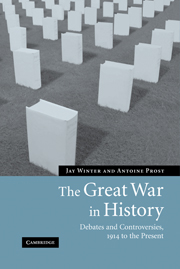Book contents
- Frontmatter
- Contents
- Preface to the English edition
- Introduction
- 1 Three historiographical configurations
- 2 Politicians and diplomats: why war and for what aims?
- 3 Generals and ministers: who commanded and how?
- 4 Soldiers: how did they wage war?
- 5 Businessmen, industrialists, and bankers: how was the economic war waged?
- 6 Workers: did war prevent or provoke revolution?
- 7 Civilians: how did they make war and survive it?
- 8 Agents of memory: how did people live between remembrance and forgetting?
- 9 The Great War in history
- Bibliography
- Index
- Studies in the Social and Cultural History of Modern Warfare
5 - Businessmen, industrialists, and bankers: how was the economic war waged?
Published online by Cambridge University Press: 05 June 2012
- Frontmatter
- Contents
- Preface to the English edition
- Introduction
- 1 Three historiographical configurations
- 2 Politicians and diplomats: why war and for what aims?
- 3 Generals and ministers: who commanded and how?
- 4 Soldiers: how did they wage war?
- 5 Businessmen, industrialists, and bankers: how was the economic war waged?
- 6 Workers: did war prevent or provoke revolution?
- 7 Civilians: how did they make war and survive it?
- 8 Agents of memory: how did people live between remembrance and forgetting?
- 9 The Great War in history
- Bibliography
- Index
- Studies in the Social and Cultural History of Modern Warfare
Summary
There have been three configurations of historical analysis of the economic history of the 1914–18 conflict. The first focused on economic policies and on the role administrators played in economic affairs during the war. The second phase, evident in the 1960s and 1970s, turned to industrial activity which was analysed in terms of the working alliances between businessmen, experts, civilian officials, and the military. This constituted a broadening of perspective from the analysis of economic policy at the level of the state to what Eisenhower christened as the military–industrial complex. In the third phase, the two approaches were merged in the analysis of war economies, understood as complex systems of production, circulation, and exchange operating on the global level to distribute goods and services among belligerents as between civilian and military claimants.
In these three phases, the work of economic historians showed the unprecedented challenges faced by industry, army, and the state after 1914. With the debatable exception of the American Civil War, there had never been a situation like it. The scale of demands made by industrial warfare after 1914 was hitherto unknown. How officials responded to these challenges, both in the public and the private sectors, forms an important part of any explanation of the defeat of the Central powers and the victory of the Allies, even when experts differ over the weight to accord to economic factors in the equation of defeat and victory.
- Type
- Chapter
- Information
- The Great War in HistoryDebates and Controversies, 1914 to the Present, pp. 109 - 125Publisher: Cambridge University PressPrint publication year: 2005



